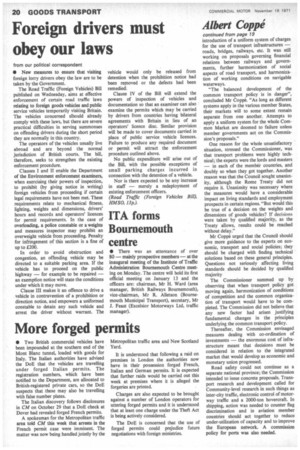Foreign drivers must obey our laws
Page 22

If you've noticed an error in this article please click here to report it so we can fix it.
from our political correspondent • New measures to ensure that visiting foreign lorry drivers obey the law are to be taken by the Government.
The Road Traffic (Foreign Vehicles) Bill published on Wednesday, aims at effective enforcement of certain road traffic laws relating to foreign goods vehicles and public service vehicles temporarily visiting Britain. The vehicles concerned slhould already comply with these laws, but there are severe practical difficulties in serving summonses on offending drivers during the short period they are normally in this country.
The operators of the vehicles usually live abroad and are beyond the normal jurisdiction of British courts. The bill, therefore, seeks to strengthen the existing enforcement procedure.
Clauses I and II enable the Department of the Environment enforcement examiners, when exercising their powers of inspection, to prohibit (by giving notice in writing) foreign vehicles from proceeding if certain legal requirements have not been met. These requirements relate to mechanical fitness, lighting, weights and dimensions, drivers' hours and records and operators' licences for permit requirements. In the case of overloading, a police constable or a weights and measures inspector may prohibit an overweight vehicle from proceeding, Penalty for infringement of this section is a fine of up to £200.
In order to avoid obstruction and congestion, an offending vehicle may be directed to a suitable parking area. If the vehicle has to proceed on the public highway — for example to be repaired — an exemption notice will state the conditions under which it may move.
Clause III makes it an offence to drive a vehicle in contravention of a prohibition or direction notice, and empowers a uniformed constable to detain any such vehicle and arrest the driver without warrant. The vehicle would only be released from detention when the prohibition notice had been removed or the defects had been remedied.
Clause IV of the Bill will extend the powers of inspection of vehicles and documentation so that an examiner can also examine the permits which may be carried by drivers from countries having bilateral agreements with Britain in lieu of an operators licence disc. Similar provision will be made to cover documents carried in place of public service vehicle licences. Failure to produce any required document or permit will attract the enforcement procedure outlined above.
No public expenditure will arise out of the Bill, with the possible exceptions of small parking charges incurred in connection with the detention of a vehicle.
Nor is there expected to be any increase in staff — merely a redeployment of existing enforcement officers.
(Road Traffic (Foreign Vehicles Bill), HMSO, 13p.).




















































































































